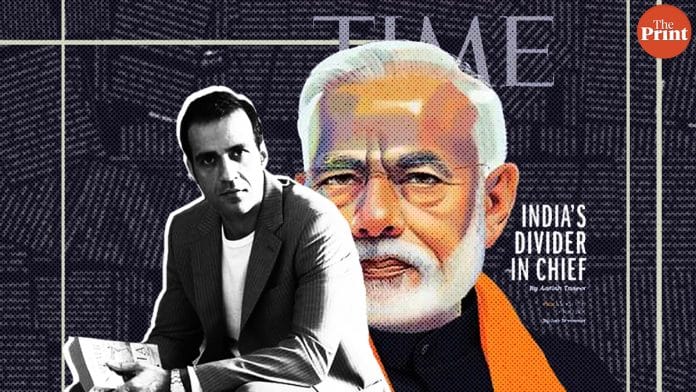TIME magazine’s latest cover, which calls Prime Minister Narendra Modi ‘divider in chief’, has ruffled many feathers. The lead article, written by journalist Aatish Taseer, says Modi has failed to deliver on his economic promises while creating an “atmosphere of poisonous religious nationalism”.
ThePrint asks: What message does it send when international media calls PM Modi “divider in chief”?
TIME article overlooks Modi govt’s policy initiatives & won’t impact elections
 Moushumi Das Gupta
Moushumi Das Gupta
Senior associate editor, ThePrint
The TIME magazine’s article may not have any impact on the Lok Sabha polls where PM Narendra Modi is seeking a re-election.
But, it will definitely dent his personal standing among his global peers. The BJP should introspect on why and how the narrative on Prime Minister Modi has dramatically changed in the international media, from then-US president Barack Obama praising Modi in a TIME article in 2015 to the ‘divider in chief’ cover in 2019.
The BJP may have publicly slammed the article but the fact is that an international publication calling an incumbent PM ‘divider in chief’ could affect global investors’ sentiment, who are being aggressively courted by India.
However, there is another side to this argument. How impartial is the international media when it comes to critiquing Indian politicians, and particularly Modi?
The TIME magazine article by Aatish Taseer may appear one-sided to many because it overlooks policy initiatives taken by the NDA government on the economic and social front – be it about implementing GST or bringing the Insolvency and Bankruptcy Code. Or, attempting to improve the decrepit sanitation infrastructure by building toilets under the Swachh Bharat Mission or empowering the poor through the Jan Dhan Yojana. Or, completing Aadhaar enrolment of 100 crore Indians.
Maybe, it would have helped if PM Modi had been more forthcoming and vocal in his criticism every time a citizen was lynched on allegations of smuggling cow and storing/selling beef.
This criticism punches hole in BJP’s claim that Modi has strengthened India’s global image
 Sanya Dhingra
Sanya Dhingra
Principal correspondent, ThePrint
When a foreign magazine with the influence that TIME enjoys calls the Indian Prime Minister a “Divider-in-Chief,” you can’t dismiss it as compulsive cynicism of a few.
You can’t even dismiss it as western media’s bias against India, for these are the same publications that had previously named Narendra Modi as one of the most influential leaders in the world, eulogising him as the ‘reformer-in-chief’.
This criticism certainly punches holes in the BJP narrative that Modi has strengthened India’s global image.
However, international press’ view of the PM is unlikely to bring any attitudinal shift in the supporters of BJP and Modi. Instead, it can possibly feed into the victim mindset, which holds any word of criticism against Modi as an attack on India’s honour.
Yet, at the same time, foreign media’s portrayal of Indian politicians and democracy should be taken with a pinch of salt. It would be naïve to assume that the West, which had predicted Indian democracy’s doom just when it was born, has completely rid itself of its ethnocentrism vis-à-vis India.
However, the West’s ethnocentrism cannot cancel out every word of criticism that comes Modi’s way.
Also read: BJP member starts petition to ‘protest’ Time report calling Modi ‘India’s divider in chief’
It’s the same Modi for whom friendships & hugs with global leaders matter
 Ruhi Tewari
Ruhi Tewari
Senior associate editor, ThePrint
Prime Minister Narendra Modi’s fans and supporters – there’s no dearth of them – are unsurprisingly up in arms against TIME magazine’s cover feature, which calls him “divider in chief”. After all, outrage is easy to generate and manufacture.
But take a step back and see how it reflects on India when the international media brands its Prime Minister in these less than glorious words. It is convenient to say one doesn’t need a certificate from the international community and only Indian voters matter. But this is the same Modi for whom friendships and public hugs with world leaders have been of utmost importance. In a way, he has used these interactions as a validation of his leadership abilities.
The article talks about how the BJP has created an atmosphere of “religious nationalism in India”. This isn’t far from the truth. The BJP’s main election plank has been terrorism and Pakistan – playing on nationalism and fear, instead of catering to hopes and aspirations.
More importantly, the entire narrative on Citizenship Bill and ‘we will throw infiltrators out’ but keep Hindu refugees is centred on majoritarian politics, with religion as the subtext.
Despite being the PM, Modi has chosen political opportunism over statesmanship and drilled fear into the hearts of people, and a rather divisive version of it.
One must ask if West would have reacted the same way had Modi delivered on economic reforms
 Srijan Shukla
Srijan Shukla
Reporter, ThePrint
To begin with, the western media must be appreciated for often objectively looking at rising majoritarianism, creeping authoritarianism, and increasing violence in India, perhaps more critically than Indian media at-large. And this has hurt India’s image globally, and rightly so.
But there is something cynical at play here. One needs to ask if the West would have reacted the same way had Narendra Modi facilitated wholesale privatisation, brought in administrative and labour reforms, and not done outrageous things likedemonetisation.
The fact is that India desperately needs foreign investment, and Modi has failed to create an encouraging economic environment for it. And, empirically speaking, this inbound investment has nothing to do with the social conditions in a country.
Globally, a country is as important as its economic and smart power. And if Modi had genuinely enhanced India’s powers, he would’ve been perceived differently by the western media.
That said, one needs to go back and look at the case of the US. Part of the reason why the US won the Cold War was because the world genuinely believed that the American democratic system was better than the authoritarian Soviet system.
So, in the long run, even if Modi delivers on reforms and economic growth, his social policies would continue to affect India’s chances of becoming a legitimate model, which the rest of the world can emulate.







Appreciate The Print team balanced analysis. Good work!
I thought we stopped licking the boots of the white man after 15th August 1947. But why are some members of the Lutyens ecosystem still on the job? God only knows…
Ironically modi has received much international acclaim as well. A foreign journalist of Pakistani lineage writing a column in time does not adequately represent “international media”.
Also this author’s father was assassinated in Pakistan while speaking for Asia bibi, and still he worries for divisions in India. Only goes on to show the hypocrisy of the individual.
Now where are all the fawning fans from Madison Square Gardens?
People who are familiar with the way Western media covers politics, both domestic and international, will not pay much heed to this. By this account, Trump and May would have jumped into river or crawled under some rock.
Exposed positions remain impartial. There is still a bit of a state of mind criticizing the West. Which is a paradox, when one sees the development mode of the country and its more or less forced march toward an Americanization of behavior, which is visible in cities. But the essential is not there. It is in crisis that the country’s fundamental institutions have been going through for several years. He is in the knack of knives brought to the state of right. It is in the emergence of illiberalism, it is in the slide towards a political system which is between that extolled by the Chinese model and that applied by the State of Singapore. Certainly India, like other countries has the right to modernize. We have the right to question the individualism and materialism of Western societies. But where is our development going? We are only trying to singer what is happening in the northern hemisphere. Where this is complicated is that we do so by ignoring our past and endangering the foundations of our civilization known for its tolerance and openness (see Vivekananda’s speech in Chicago)
It is our old habit to write even without fully reading the concerned article. All the above contributors fail to mention that Aatish Tassir, the author is also critical of the Congress. Sending Priyanka Gandhi to help her brother Rahul, according to Tassir, is equivalent to the Democratic Party fielding Hillary Clinton again in 2020, with added enticement of her daughter Chelsea as Vice President. Tassir concludes that Modi is very lucky to be blessed with very weak opposition- a rag tag coalition led by the Congress with no agenda to defeat Modi. Why this part is missing? Incidentally, the same issue contains another article entitled, “Modi is India’s Best Hope for Economic Reforms” by Ian Bremmer. Again none of the contributors found it necessary to comment on the contents of this article. The entire exercise is hollow intellectualism and lacks integrity.
To answer Shri Srijan Shukla’s query, for Time, economic reforms, or their absence, would have no bearing on this story. Not even for The Economist, for that matter. The West recognises the economic importance of Saudi Arabia, a major buyer of arms as well, but its media does not give Prince MbS a free pass. 2. Difficult to recall the last time one saw a hagiographic account about India in the western media. No conspiracy theories at work. They are reporting events and developments as they occur, without any filters or bias. 3. As India has grown and prospered – despite large patches of poverty – the West has applauded our achievements. The IT industry and the diaspora have been especially valuable in changing global perceptions. Much before that, in what could be called the snake charmers’ phase, there was genuine respect for the success India was making of its democracy when so many of what were regarded its prerequisites were missing. To handle so much diversity with sensitivity and compassion was appreciated. 4. There should be deep introspection on what is happening to our image, not just in the West, but starting next door in South Asia.